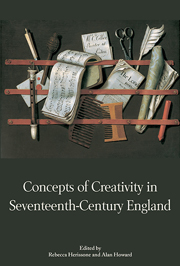Book contents
- Frontmatter
- Contents
- List of Illustrations
- List of Contributors
- Preface
- Introduction
- Creating to Order: Patronage and the Creative Act
- Creative Identity and the Role of Print Media
- Mapping Knowledge: The Visual Representation of Ideas
- Authorial Identity
- Imitation and Arrangement
- The Performer as Creator
- 11 ‘Our Friend Venus Performed to a Miracle’: Anne Bracegirdle, John Eccles and Creativity
- 12 Music and Manly Wit in Seventeenth-Century England: The Case of the Catch
- Bibliography
- Index
12 - Music and Manly Wit in Seventeenth-Century England: The Case of the Catch
from The Performer as Creator
Published online by Cambridge University Press: 05 March 2014
- Frontmatter
- Contents
- List of Illustrations
- List of Contributors
- Preface
- Introduction
- Creating to Order: Patronage and the Creative Act
- Creative Identity and the Role of Print Media
- Mapping Knowledge: The Visual Representation of Ideas
- Authorial Identity
- Imitation and Arrangement
- The Performer as Creator
- 11 ‘Our Friend Venus Performed to a Miracle’: Anne Bracegirdle, John Eccles and Creativity
- 12 Music and Manly Wit in Seventeenth-Century England: The Case of the Catch
- Bibliography
- Index
Summary
In Act II, Scene 3 of William Shakespeare's Twelfth Night, first performed as the seventeenth century opened, the knights Sir Toby Belch and Sir Andrew Aguecheek call for wine. Immediately after the arrival of the clown, Feste, Aguecheek asks for a song and his drinking companion a catch. Their merry midnight revels are interrupted by Maria, serving woman to their hostess (who is also Sir Toby's niece), following their performance of the three-voice catch ‘Hold thy peace’. ‘What a catterwalling doe you keepe heere?’, exclaims Maria; ‘If my Ladie haue not call'd vp her Steward Maluolio, and bid him turne you out of doores, neuer trust me.’ The puritanical Malvolio is even more horriied by their acoustical antics. ‘My masters are you mad?’, he asks on his arrival,
Or what are you? Haue you no wit, manners, nor honestie, but to gabble like Tinkers at this time of night? Do yee make an Ale-house of my Ladies house, that ye squeak out your Coziers Catches without any mitigation or remorse of voice? Is there no respect of place, persons, nor time in you?
This brief scene, first brought to life approximately a decade before the earliest publication of English catches and over a century ahead of the greatest vogue for such canonical vocal part-songs, already encodes the most important aspects of the genre. As demonstrated by Shakespeare's three performers, the singing of catches was a form of participatory leisure entertainment for males of equal voice.
- Type
- Chapter
- Information
- Concepts of Creativity in Seventeenth-Century England , pp. 281 - 308Publisher: Boydell & BrewerPrint publication year: 2013

